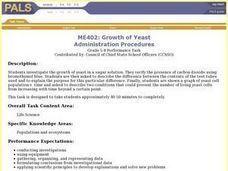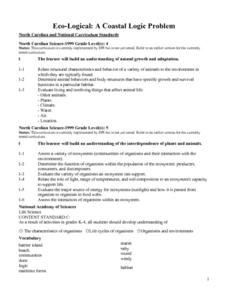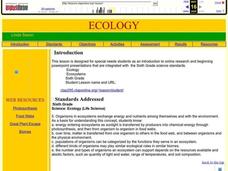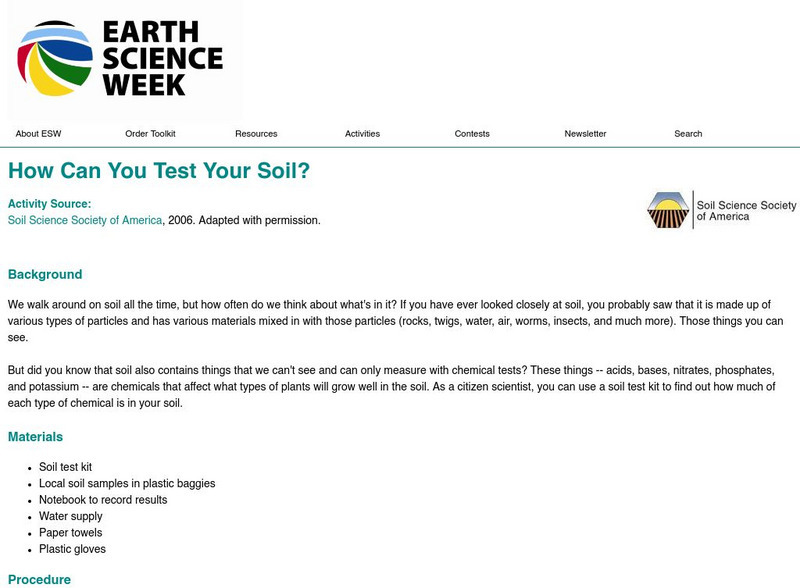Curated OER
Detecting Magnetic Materials in "Martian" Soil
Students simulate some of the Pathfinder experiments by devising methods of collecting and measuring magnetic substances in pseudo-Martian soil. The efficiency of each of the methods used to collect materials is evaluated in this lesson.
Curated OER
ME402: Growth of Yeast
Students investigate the growth of yeast in a sugar solution. They verify the pressure of carbon dioxide using bromothymol blue. Students are asked to describe the difference between the contents of the test tubes used and to explain...
Curated OER
pH Potential
Students experiment to determine the positive and negative impacts of human activities on environmental change. They examine how physical and biological processes such as decomposition affect soil characteristics while looking at the pH...
Curated OER
Reflection and Absorption of Light
Students use a microcomputer connected to a light sensor and temperature probe to explore the reflection and absorption of radiation for different surfaces. Students follow instructions in this guided inquiry based lab and are then asked...
Curated OER
Reading the River
In collaborative groups, young ecologists measure the temperature, pH, and dissolved oxygen for three different freshwater samples. They examine each sample with a microscope and record observations on the microorganisms in the pond...
Curated OER
Seeds of Wetland Life
Students participate in several activities on seed exploration. In this biology lesson, students classify seeds according to their dispersal method. They explain the different adaptations plant have to disperse their seeds.
Curated OER
Looking At Acid's Effects On Metals
Students perform an experiment that demonstrates acid rain. The chemical effect of acids on metals may take at least five days for the human eye to see, even though the reaction starts as soon as the acid contacts the metal.
Curated OER
Rocks, Minerals, and Erosion
Fourth graders describe the difference between minerals (composed of the same substance throughout) and rocks (composed of two or more minerals). They recognize that there are three classes of rocks: igneous, sedimentary, and metamorphic
Curated OER
Eco-Logical: A Coastal Logic Problem
Fourth graders study the characteristics of five coastal communities. They use logic cards and matching activities to identify the proper community for plant and animal species.
Curated OER
Ecology
Sixth graders are introduced to online research and beginning PowerPoint presentations that are integrated. They pass a plant and photosynthesis. Students locate information on a self selected animal online. They give a PowerPoint...
Curated OER
Map Reading
After examining a map from 1803 and 2003, they explore how to become map readers. They describe what they see on the map from 1803 and compare the information to the map from 2003. Students create their own map of the neighborhood that...
Science Education Resource Center at Carleton College
Serc: Investigating Soil Composition Soil Soaks Up Water
In this classroom activity, students will show how soil composition affects the amount of water the soil holds. They will test sand and soil independently and then create their own mixture.
American Geosciences Institute
American Geosciences Institute: Earth Science Week: How Can You Test Your Soil?
As a citizen scientist, students use a soil test kit to find out how much of each type of chemical is in the local soil.
PBS
Pbs Teachers:destination Galapagos Islands: Testing the Earth, Soil Comparison B
Compare soil composition from different regions of the Earth, including the Galapagos Islands, and perform analysis of three important macronutrients found in regional soil.
Science Education Resource Center at Carleton College
Serc: Mn Step: What Happens to Water When It Hits the Ground?
For this activity, learners test the percolation rates of water passing through different soil compositions.
TeachEngineering
Teach Engineering: Shallow & Deep Foundations
Students investigate the critical nature of foundations as they learn differences between shallow and deep foundations, including the concepts of bearing pressure and settlement. Using models representing a shallow foundation and a deep...
TeachEngineering
Teach Engineering: Obi Wan Adobe: Engineering for Strength
Students conduct an experiment to determine how varying the composition of a construction material affects its strength. They make several adobe bricks with differing percentages of sand, soil, fibrous material and water. They test the...


















